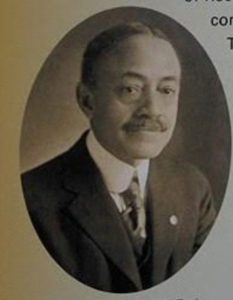
Warner T. McGuinn
*The birth of Warner T. McGuinn on November 23rd, 1859, is celebrated on this date. He was a Black lawyer and politician.
He was one of three sons of Jared and Fannie McGuinn, who were from Goochland County near Richmond, Virginia. His older brother, the Rev. Robert A. McGuinn, was also born in Virginia and moved to Baltimore. A half-brother, the Rev. William M. Alexander, was the pastor of Sharon Baptist Church in Baltimore and the first editor of the Baltimore Afro-American newspaper.
He was educated in public schools in his native county, Richmond and Baltimore. He graduated from Lincoln University, MO, in 1884, studied law at Howard University, and graduated from Yale Law in 1887. Noteworthy items from his Yale years include the presidency of the Law Club, a prize in oratory, and the commencement of a friendship with Mark Twain. Twain decided to finance McGuinn’s studies after meeting him and discovering that the student was working to pay his way through school.
McGuinn began practicing law in Kansas City, Kan., in 1887 and later edited a black newspaper there before moving to Baltimore in 1891. Passing the Baltimore bar in 1892, he established a law practice and was a partner in the firm of Cummings and McGuinn. In addition to his legal practice, he handled the legal affairs of Afro-Americans. After the Republican victories in the 1890s, he was named secretary of the Board of Liquor License Commissioners.
Several Black Republicans were elected to the City Council between 1890 and 1931, and McGuinn, who was first elected in 1919, later served two terms. He served in the First Branch from 1919 to 1923 and later in the Consolidated Council from 1927 to 1931. He married Anna L. Wallace, a Virginia-born daughter of Harrietta and William Wallace. Their daughter Alma was born in September 1895. The McGuinns lived at 1911 Division Street.
He was an early supporter of women's suffrage and equated it with African Americans' struggle for civil rights. In a paper he read on the subject before the congregation of Bethel A.M.E. Church in Baltimore in 1911, he reminded his listeners that all adults, regardless of sex or color, had a right to vote and elect their representatives. He successfully argued the celebrated "Baltimore Segregation Case" in 1917 in federal court, which prohibited the further segregation of blacks into special city areas. His wife, Anna, died in 1929. Warner McGuinn died in Philadelphia at his daughter Alma's house on July 10, 1937, and was buried at Arbutus Memorial Park. He was 73.